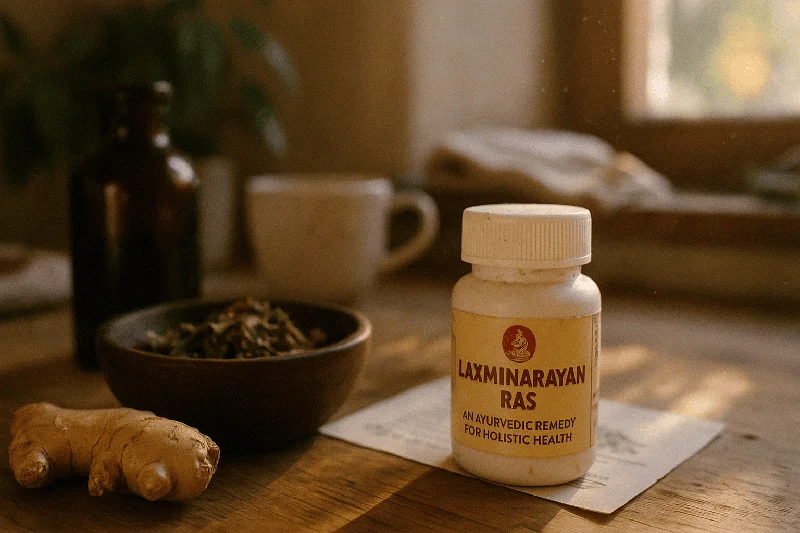Ask Ayurvedic doctor a question and get a consultation online on the problem of your concern in a free or paid mode. More than 2,000 experienced doctors work and wait for your questions on our site and help users to solve their health problems every day.
Laxminarayan Ras: An Ayurvedic Remedy for Holistic Health

Ayurveda, the ancient Indian system of medicine, offers numerous formulations for various health issues, and Laxminarayan Ras is one such potent remedy. Known for its ability to address digestive disorders, fever, and respiratory ailments, Laxminarayan Ras is a traditional Ayurvedic medicine that has been trusted for centuries. This article explores the uses, benefits, ingredients, and precautions associated with Laxminarayan Ras, providing a comprehensive guide to this Ayurvedic gem.
What is Laxminarayan Ras?
Laxminarayan Ras is an Ayurvedic herbo-mineral formulation primarily used to treat digestive issues, fever, and respiratory problems. It is a combination of natural ingredients and purified metals that work synergistically to balance the body’s doshas, particularly Vata and Kapha. This medicine is prepared following strict Ayurvedic guidelines to ensure its safety and efficacy.
Don't wait or self medicate. Start chat with Doctor NOW
Key Ingredients of Laxminarayan Ras
Laxminarayan Ras is composed of various potent ingredients, each contributing to its therapeutic effects. The primary ingredients include:
-
Shuddha Parad (Purified Mercury): Known for its rejuvenating properties, Parad helps in balancing the doshas and improving overall vitality.
-
Shuddha Gandhak (Purified Sulfur): Sulfur is a natural detoxifier that enhances digestion and boosts immunity.
-
Abhrak Bhasma (Purified and Processed Mica): Abhrak Bhasma supports respiratory health, strengthens the lungs, and improves energy levels.
-
Shunthi (Ginger): Ginger is a digestive stimulant that alleviates nausea, indigestion, and bloating.
-
Maricha (Black Pepper): Black pepper enhances metabolism and absorption of nutrients.
-
Pippali (Long Pepper): Pippali is known for its respiratory benefits, aiding in the management of cough and cold.
Benefits of Laxminarayan Ras
Laxminarayan Ras offers a wide range of health benefits, making it a valuable addition to Ayurvedic treatments. Some of the key benefits include:
1. Improves Digestion
Laxminarayan Ras is highly effective in managing digestive issues such as indigestion, bloating, and loss of appetite. It stimulates digestive fire (Agni) and promotes proper digestion.
2. Relieves Respiratory Disorders
This formulation is beneficial in treating respiratory ailments like cough, cold, and bronchitis. Its expectorant properties help in clearing mucus and improving breathing.
3. Reduces Fever
Laxminarayan Ras acts as an antipyretic, helping to reduce fever and associated symptoms. It also strengthens the body’s immunity to fight infections.
4. Balances Doshas
The combination of ingredients in Laxminarayan Ras helps balance Vata and Kapha doshas, ensuring overall harmony in the body.
5. Boosts Immunity
Its natural ingredients enhance the immune system, making the body more resilient to infections and illnesses.
How to Use Laxminarayan Ras
Laxminarayan Ras should be taken under the guidance of a qualified Ayurvedic practitioner. The dosage and method of consumption depend on the individual’s condition and constitution. Generally, the recommended dosage is:
-
Adults: 125 mg to 250 mg twice daily after meals.
-
With: Honey, ginger juice, or lukewarm water, as directed by an Ayurvedic doctor.
Precautions and Side Effects
While Laxminarayan Ras is a potent Ayurvedic formulation, it is essential to use it with caution. Here are some precautions to consider:
-
Consultation: Always consult an Ayurvedic practitioner before starting this medicine, especially if you are pregnant, lactating, or have pre-existing conditions.
-
Dosage: Stick to the prescribed dosage to avoid any adverse effects.
-
Allergic Reactions: Perform a patch test if applying topically or check for any allergic reactions after consumption.
-
Not for Long-Term Use: Prolonged use should be avoided unless advised by a doctor.
Conclusion
Laxminarayan Ras is a time-tested Ayurvedic remedy that addresses a variety of health concerns, from digestive issues to respiratory disorders. Its unique blend of natural and mineral ingredients makes it a powerful tool in restoring balance and promoting overall health.
When used under the guidance of a qualified Ayurvedic practitioner, Laxminarayan Ras can offer safe and effective relief from various ailments. Embrace the wisdom of Ayurveda and let Laxminarayan Ras be a part of your journey toward holistic wellness.

